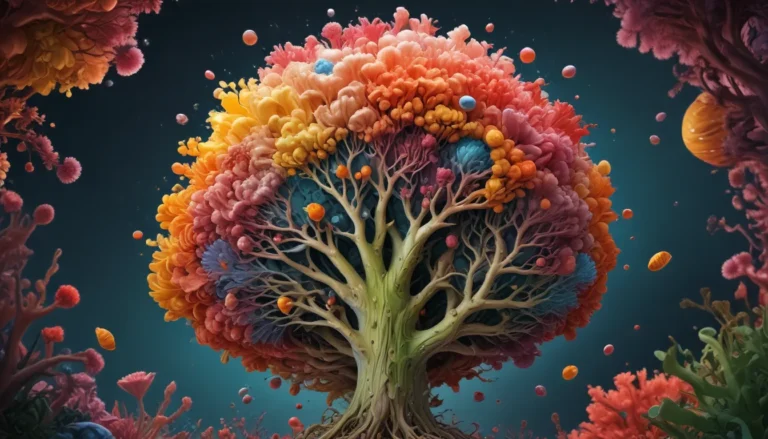A Note About Images: The images used in our articles are for illustration purposes only and may not exactly match the content. They are meant to engage readers, but the text should be relied upon for accurate information.
Nitrogen fixation is a captivating natural process that holds the key to sustaining life on Earth. This remarkable phenomenon involves the conversion of atmospheric nitrogen into a form that can be utilized by plants and other organisms, playing a vital role in the global nitrogen cycle. Let’s embark on an enlightening journey to uncover 13 mind-blowing facts about nitrogen fixation, from its discovery to its significance in agriculture and ecology.
Exploring the World of Nitrogen Fixation
Nitrogen fixation is the natural process through which atmospheric nitrogen, an essential element for all living organisms, is converted into compounds like ammonia that can be readily used by plants and other organisms. This process is primarily carried out by nitrogen-fixing bacteria, such as Rhizobium, Azotobacter, and Cyanobacteria, which possess the extraordinary ability to transform atmospheric nitrogen into ammonia through enzymatic reactions.
The Symbiotic Relationship Between Legumes and Nitrogen-Fixing Bacteria
Legumes, including beans, peas, and clover, form symbiotic relationships with nitrogen-fixing bacteria, providing a home for these beneficial organisms in special nodules on their roots. In exchange, the bacteria supply the plants with ammonia, promoting healthier growth and enriching the soil with nitrogen. This mutually beneficial partnership enhances soil fertility and supports sustainable agricultural practices.
- Key Takeaway: Understanding nitrogen fixation can revolutionize farming practices, enabling farmers to reduce their reliance on synthetic fertilizers and promote environmentally friendly agriculture.
The Impact of Nitrogen Fixation in Agriculture and Ecology
Nitrogen fixation plays a crucial role in ensuring the fertility of agricultural soils by replenishing nitrogen levels naturally. By harnessing the power of nitrogen-fixing bacteria, farmers can enhance soil fertility, reduce environmental impacts, and improve crop productivity. Additionally, nitrogen fixation contributes to the ocean ecosystem by supporting the growth of marine phytoplankton, which forms the basis of the marine food web.
The Evolution of Nitrogen-Fixing Relationships in Plants
While legumes are well-known for their symbiotic relationships with nitrogen-fixing bacteria, certain non-legume species, like Alder and Casuarina trees, have also evolved to form mutualistic associations with these beneficial microorganisms. This adaptive trait allows these plants to thrive in nitrogen-poor environments, showcasing nature’s ingenious mechanisms for survival.
The Revolutionary Impact of Industrial Nitrogen Fixation
The development of the Haber-Bosch process in the early 20th century revolutionized agriculture by enabling the large-scale production of synthetic ammonia. This breakthrough allowed for the mass production of nitrogen-based fertilizers, significantly boosting agricultural productivity and transforming farming practices on a global scale.
- Interesting Fact: Cyanobacteria, also known as blue-green algae, play a vital role in freshwater ecosystems by fixing atmospheric nitrogen and contributing to the overall productivity of aquatic environments.
Unveiling the Energy-Intensive Nature of Nitrogen Fixation
The enzymatic reactions involved in nitrogen fixation require a substantial amount of energy, prompting nitrogen-fixing organisms to develop efficient strategies to regulate and control the process. Environmental factors like temperature, pH levels, and nutrient availability can influence the efficiency of nitrogen fixation, highlighting the intricate balance required for this essential biological process.
The Role of Nitrogen Fixation in Sustainable Agriculture and Environmental Conservation
The study of nitrogen fixation has significant implications for promoting sustainable agriculture practices and conserving natural ecosystems. By understanding the mechanisms and ecological relationships involved in nitrogen fixation, we can develop innovative farming techniques, reduce environmental impact, and strive towards a more sustainable and balanced future for our planet.
- Key Takeaway: Harnessing the power of nitrogen fixation can lead to improved soil fertility, reduced dependency on synthetic fertilizers, and enhanced environmental conservation efforts.
Conclusion: Embracing the Marvels of Nitrogen Fixation
Nitrogen fixation stands as a testament to nature’s brilliance in sustaining life on Earth. From the intricate symbiotic relationships between plants and bacteria to the revolutionary impact of industrial nitrogen fixation, the world of nitrogen fixation is filled with awe-inspiring facts. By appreciating the wonders of this natural process, we can unlock its potential to address global challenges, promote sustainable agriculture, and create a healthier, more balanced planet for future generations to enjoy.
We invite you to delve deeper into the fascinating realm of nitrogen fixation, explore the interconnectedness of ecosystems, and marvel at nature’s ingenious solutions for sustaining life on our planet.
FAQs: Unraveling the Mysteries of Nitrogen Fixation
-
Q: What is nitrogen fixation?
A: Nitrogen fixation is the biological process through which atmospheric nitrogen is converted into usable forms by certain microorganisms, such as bacteria and cyanobacteria. -
Q: How does nitrogen fixation benefit plants and the environment?
A: Nitrogen fixation allows plants to access nitrogen for growth and enhances soil fertility, reducing the need for synthetic fertilizers and mitigating the negative effects of nitrogen pollution on the environment. -
Q: Can humans promote nitrogen fixation in sustainable agriculture?
A: Yes, by utilizing practices like planting legumes and partnering with nitrogen-fixing bacteria, humans can enhance nitrogen fixation and promote sustainable agricultural practices.
Let’s continue our journey of discovery and appreciation for the wonders of nitrogen fixation, a process that sustains life on Earth and offers valuable insights for sustainable living and environmental conservation.






